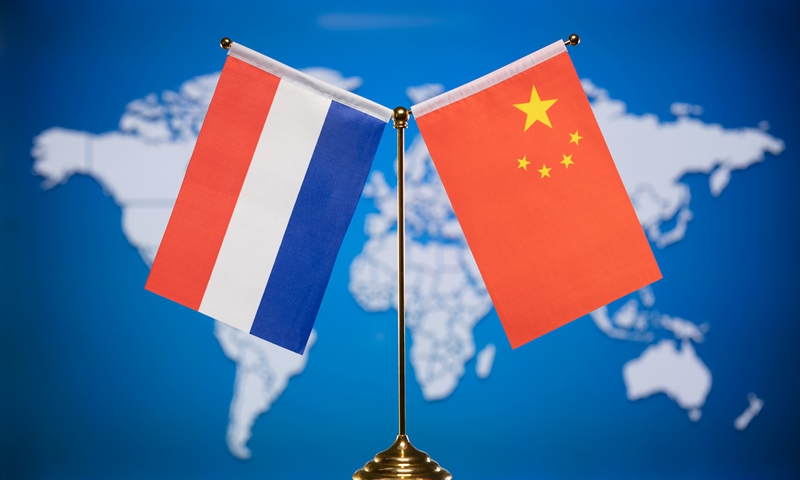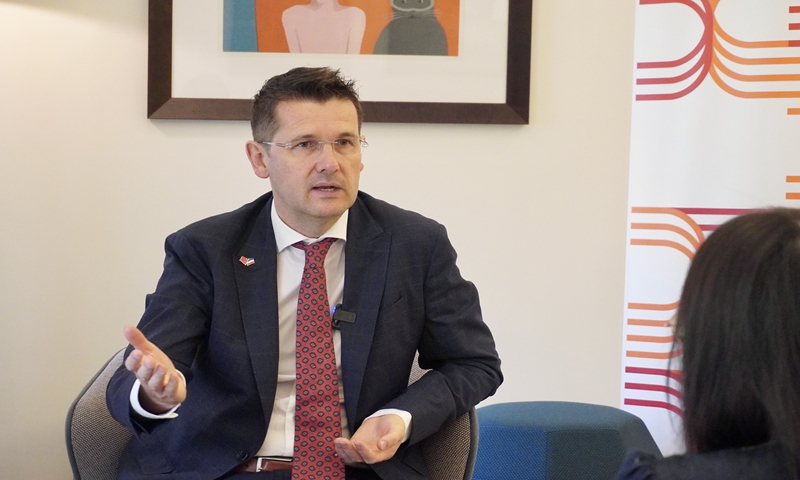
China and the Netherlands (File photo: VCG)
The trend of China and the Netherlands expanding bilateral investment and trade ties has grown increasingly solid, fuelled by their shared goal to push development in industries such as new energy and digitalization, although coronavirus outbreaks have caused some practical challenges, officials from the Netherlands said on Tuesday.
They made the comments during a press conference in Shanghai to celebrate the 50th anniversary of the establishment of diplomatic relations at the ambassadorial level.
Sachi Claringbould, deputy consul general at the consulate general of the Netherlands in Shanghai, said during the conference that she observed Dutch companies coming to China, especially to the Yangtze River Delta, remain stable. About 500-600 Dutch companies are operating in the Delta ranging from multinationals to small companies and covering a wide array of industries from agriculture to energy, she said.

Sachi Claringbould, deputy consul general at the consulate general of the Netherlands in Shanghai,talks to media during a press conference on Tuesday in Shanghai. (Photo: courtesy of Netherlands Foreign Investment Agency)
"It's not only because of China's size, which offers many opportunities, but also because China has very good infrastructure and supply chains. It functions smoothly, and a lot of dynamism/innovation is happening here. So I think there's a lot of reasons for Dutch entrepreneurs to want to be here," she said.
Chinese companies' investment in the Netherlands has expanded from traditional areas like logistics to multiple areas like life sciences and electronics. In particular, many Chinese internet and high-tech companies have tapped into the Dutch market in the past two years, as they view the Netherlands as a crucial "testing ground" for making breakthroughs in international markets, said Roland Brouwer, executive director for China, Netherlands Foreign Investment Agency.
Bilateral trade has also increased, expanding 26.9 percent year-on-year to about $116 billion in 2021, Chinese customs data showed.
According to the officials, although the coronavirus outbreaks and particularly the recent lockdown in Shanghai caused some inconvenience to businesses, they didn't see major withdrawals of investment from either side.
The coronavirus will bring about a negative impact "in practical terms like being harder to travel...but companies that really have a good product and abilities are still proceeding with their investment projects," Brouwer told the Global Times on Tuesday.

Roland Brouwer, executive director for China, Netherlands Foreign Investment Agency. (Photo: courtesy of Netherlands Foreign Investment Agency)
Claringbould said that the overall trade situation has been very good over the past years between the two countries, but this year has unpredictable factors like the lockdown in Shanghai.
"We have not heard of big companies saying they are going to pull out of China completely," she said, adding that some companies are coming ashore after trading for a while, but there are also small companies that are seeking international opportunities elsewhere because of COVID restrictions.
Economic cooperation between China and the Netherlands, as well as other EU countries, is also facing extra pressure from geopolitical tensions. According to a Bloomberg report, the US is pushing the Netherlands to bar ASML, the famed maker of lithography tools, from selling to China mainstream technology essential in making chips.
"No decisions have been made and we do not want to speculate or comment on rumors," ASML said in a statement sent to the Global Times. But the company stressed that the deep ultraviolet immersion technology is prevalent in the installed base of semiconductor manufacturers all over the world, and contributes every day to the manufacturing of microchips that are critical for very important end markets that are suffering from chip shortages.
Claringbould said that the Dutch government has a case-by-case approach to export controls, and that the country looks at economic interests and security interests to make decisions on whether to permit exports.
According to Brouwer, there have been far fewer exchanges, especially person-to-person exchanges, because of COVID-19 restrictions. "I hope there will be more talks, more discussions, more dialogues between China and the EU that will definitely benefit the relations."
Officials stressed that China and the Netherlands have many areas for future cooperation in terms of investment. For instance, new energy vehicles are a good area for Chinese companies to ramp up investment in the Netherlands, which has a plan to go electric in the transportation sector, while China has advantages in electric car making that are outshining some European competitors, Brouwer said.
Claringbould noted that as both China and the Netherlands are searching for solutions to tackle challenges of digitalization and climate change, those are areas where China-Netherlands cooperation is "increasingly possible."


